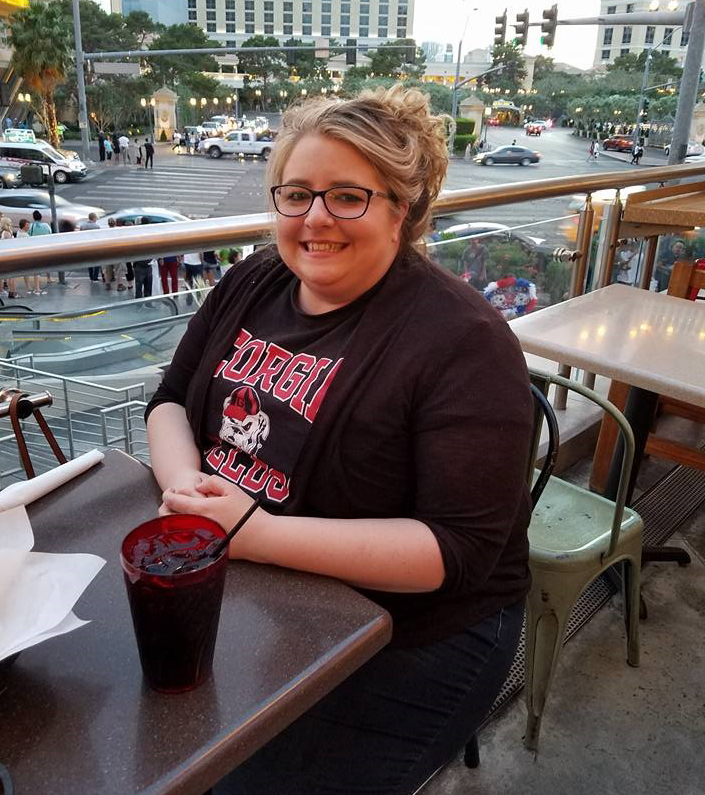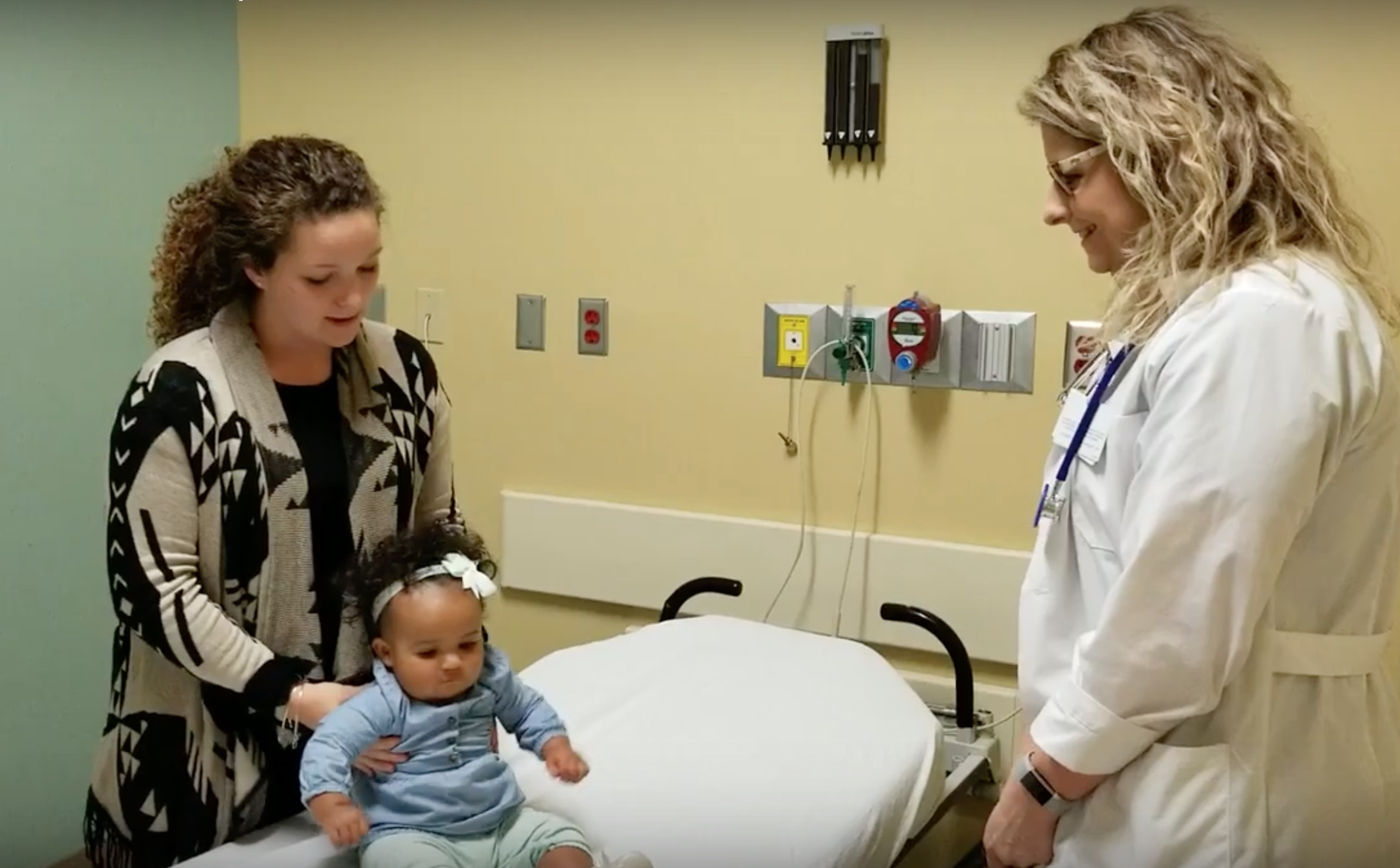Now ‘Half Her Size,’ PA Inspires Patients With Weight Loss Journey
‘I Wanted to Walk the Walk and Talk the Talk’
April 9, 2019
By Jennifer Walker

A number of events came together to push Katrina Rigden, a PA in the emergency department, on a personal health journey. Rigden, who weighed 345 pounds at one time, was feeling increasingly worse at work. “With ER medicine, you’re on your feet and you have to be fast and you have to fit in tight spaces sometimes. I just felt sluggish,” she says. She also faced daily hurdles that made her feel embarrassed or uncomfortable, such as the time she struggled to slip through a small space to get to her table at a restaurant with her colleagues. Flying was also a challenge. Before buying her ticket, Rigden would look up the width of the airline’s seat; then, on the day of her flight, she would board the plane with sweaty palms, still worried about whether she would fit into the space.
It was in 2016, when Rigden was on a beach vacation with her mom, that she started to think about changing her health. Growing up in Florida, she had always loved the beach, but on this trip, she didn’t want to go down to the water because she didn’t feel comfortable in her clothes. “It was to the point where I didn’t even want to do what I loved,” she says. On the ride home, her mom suggested the Jenny Craig Anywhere program; Rigden called the company but was still hesitant to join. Soon after, Rigden was at work, and she felt dizzy when she started to stand up after taking a patient’s pulse in her feet.
[PA Experts Respond to Pressing Nutrition Questions]
This was the turning point: She went into the bathroom to splash water on her face, then pulled out her phone to order a Jenny Craig starter kit.
Since then, Rigden has lost 178 pounds, and her story was featured in People magazine’s “Half Their Size” issue this year. Along with the confidence and the sense of accomplishment that come with weight loss, “I feel really good because I’m promoting good health to [my patients] in both my practice and my lifestyle, and they see that,” she says.

A personal health challenge
Rigden has struggled with her weight since high school. She was active then, playing the mellophone in the marching band, but she still felt self-conscious, often covering up herself with clothes, especially at the beach. She tried many diets and she would lose some weight, but she wasn’t able to sustain the changes.
In 2011, when she entered the PA program at Shenandoah University in Winchester, Virginia, “I was the one who just studied, studied, studied,” Rigden says. “I let the stress of PA school totally get to me, and I always went for convenience and fast food, and my weight was just spiraling downhill.” Two years later, when Rigden began working with ApolloMD and was placed in the emergency department at Houston Medical Center in Warner Robins, Georgia, she started working 22 to 24 shifts a month to pay off her student loans. Losing weight didn’t seem like a possibility.
[Free CME: Obesity Leadership Edge]
Rigden takes pride in her work and she has been successful, becoming the lead PA for her department and pushing for changes that have reduced wait times in the emergency department at her hospital. But before her weight loss, she also felt like some of her patients didn’t see her as an authority on healthy living. “It’s hard to counsel patients on diabetes and controlling their sugars if you are huffing and puffing and sweating and wiping your brow. It just seems unfit, and that really bothered me,” she says. “It just got to the point where I really wanted to be taken seriously at work. I wanted to walk the walk and talk the talk.”

Making health a priority
The Jenny Craig Anywhere program turned out to be a good fit for Rigden because it combines convenience with healthy eating. The meals are delivered to her doorstep so she can easily pack them to eat at work or prepare them after long shifts. Also, “once you start losing weight, it’s so incredibly easy to keep going,” she says. Three months into the program, Rigden also began to exercise, using the Elliptical machine in her apartment complex a few times a week. She continues to maintain her healthy lifestyle.
Early in her weight loss journey, Rigden had come across the People magazine “Half Their Size” issue while checking out at the grocery store. Looking for motivation to continue with her new way of eating, she bought the magazine. As she flipped through the pages, she noticed a few of the other women featured, but Rigden didn’t expect to lose as much weight as they did. She surprised herself though, and this year, she joined People’s “Half Their Size” Class of 2019.
Today, Rigden also uses her personal health journey to inspire her patients who are dealing with potentially weight-related health problems, such as plantar fasciitis. “I can tell them, ‘I’ve been there before. I was 345 pounds once, so I understand what’s it’s like and I used to have that pain in my foot, too, and this is how I fixed it,” she says. Sharing this experience has made an impact: “I had some patients come back and tell me, ‘I listened to your story and I kept seeing you shrinking and it really motivated me,’” Rigden says. One woman even said that she lowered her A1C because of Rigden’s story.

For PAs who want to address obesity
Nearly 40 percent of adults and nearly 19 percent of youth have obesity, according to the 2015-2016 CDC report. To prepare practitioners to treat this chronic disease, AAPA launched the Primary Care Obesity Management Certificate Program in 2018 in collaboration with the American Association of Nurse Practitioners and the Obesity Medicine Association. The program, which is currently being prepared for the 2019-2020 year, consists of quarterly webinars and two practice improvement projects and provides a closed community of support through a social learning platform. PAs who want to participate can fill out an interest form.
AAPA is also offering a half-day Obesity Leadership Edge Symposium on May 19 at AAPA 2019 in Denver; here, participants will learn about how to talk to patients about their weight and the treatment options that are available. Obesity Leadership Edge is also a seven-module program that is offered online and that can be used for CME credits; PAs who complete all seven modules will earn the Essentials in Obesity Management Certificate.
For PAs who are treating patients who have obesity, Rigden shares the advice she gives her patients: Whatever weight loss program they choose, they should set a goal to stick it out in the beginning, when the program will feel the hardest. “I tell [my patients], if you can just give yourself three to four days without giving up, you’ll notice and you’ll feel so much better,” she says. “And I promise you won’t go back.”
More Resources
Primary Care Obesity Management Certificate Program
PA Experts Respond to Pressing Nutrition Questions
PA Eager to Learn Primary Care Obesity Management Tools
Jennifer Walker is a freelance writer in Baltimore, MD. Contact Jennifer at [email protected].
Thank you for reading AAPA’s News Central
You have 2 articles left this month. Create a free account to read more stories, or become a member for more access to exclusive benefits! Already have an account? Log in.



